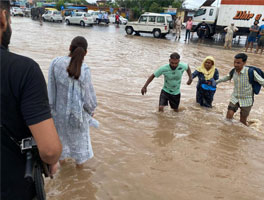 |
Dear readers,
Welcome to the Climate Weekly newsletter by the Centre for Science and Environment’s Climate Change programme and Down to Earth.
Climate change is fuelling a growing trend of increasingly unpredictable weather events each year, and this monsoon season is no exception to the anomaly. It is resulting in some regions experiencing irregular rainfall patterns and deficient rainfall, while others are facing intensified downpours and flooding events.
Over the past few days, North India has experienced a deluge of rainfall, breaking numerous records and leaving a significant impact on the region. From July 1 to July 10, several parts of the region, including Delhi, Chandigarh, and Himachal Pradesh, witnessed unprecedented rainfall, surpassing previous records. This video report from Down To Earth shows the extent of the devastation.
As the climate crisis unfolds, this is also the year of the onset of the El Nino phenomenon. Read how it impacts India, its implications for global climate tipping points, and the anticipated changes to El Nino in the future.
And lastly, I document how countries are signing bilateral deals to use carbon markets to address their emission reduction targets, through Article 6.2 of the Paris Agreement.
|
|
 |
| |
 |
|
| |
 |
 |
| |
By - Trishant Dev
Climate Change, CSE
|
| |
|
 |
|
|
| |
 |
|
| |
| EXTREME WEATHER TRACKER |
| |
North India Deluge 2023: Rainfall during July 1-10 broke multiple records, 13 July 2023
|
 |
 |
|
|
| |
 |
|
| |
 |
 |
Monsoon 2023: Skewed rainfall distribution drowning north, northwestern India while peninsular south remains dry, 11 July 2023
|
|
|
| |
|
|
| |
|
|
| |
 |
|
| |
|
|
| |
|
|
| |
|
|
| |
 |
|
| |
|
|
| |
 |
|
| |
CLIMATE NEWS | SCIENCE| IMPACTS| POLITICS |
|
| |
 |
|
| |
|
|
| |
 |
|
| |
|
|
| |
 |
|
| |
|
|
| |
 |
|
| |
|
|
| |
 |
|
| |
|
|
| |
 |
|
| |
|
|
| |
 |
|
| |
|
|
| |
 |
|
| |
|
|
| |
 |
|
| |
|
|
| |
 |
|
| |
| Video |
|
|
| |
|
|
|
|
|
|
| |
|
|
| Online Training |
|
|
| |
|
|

|
|
|
| |
|
|